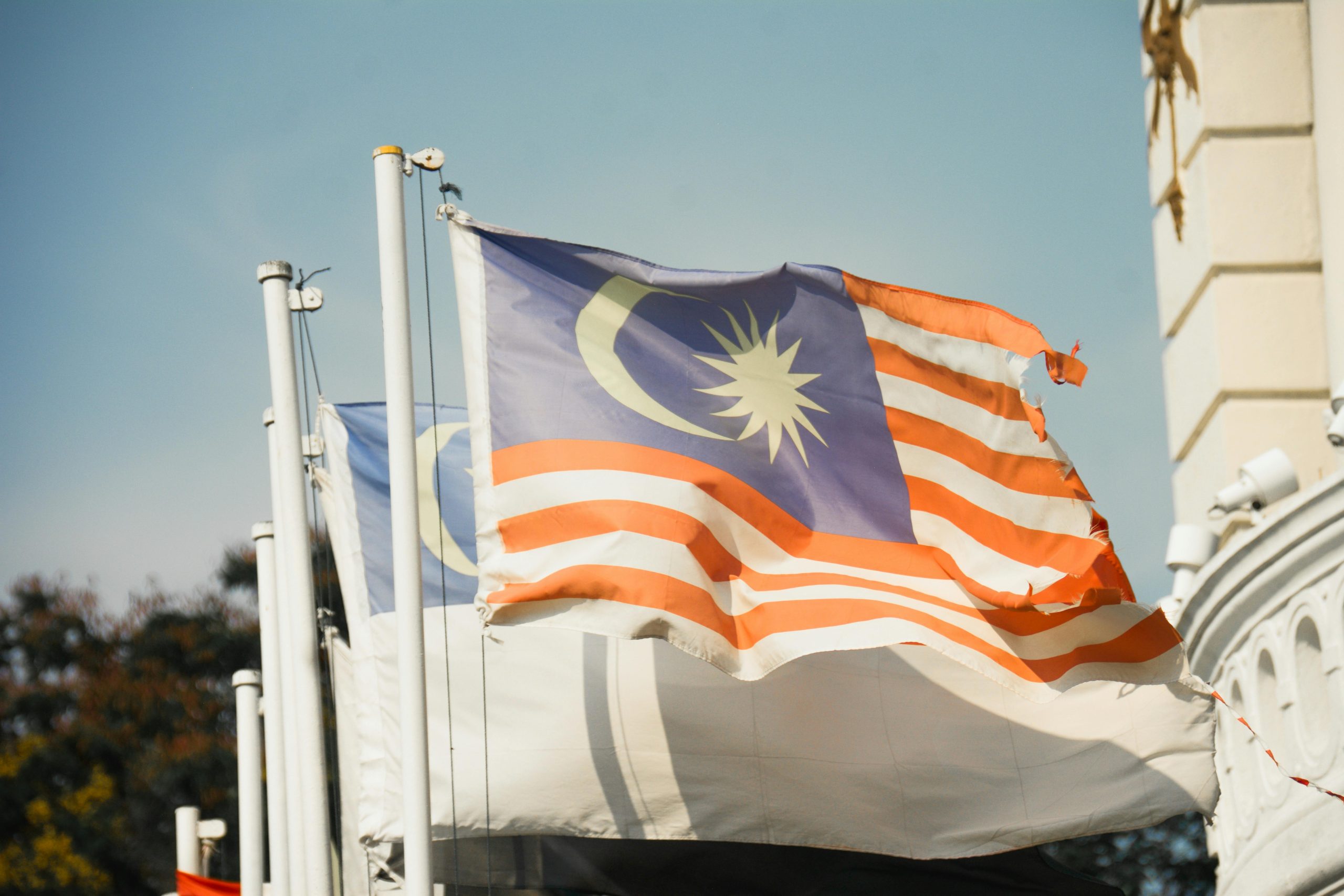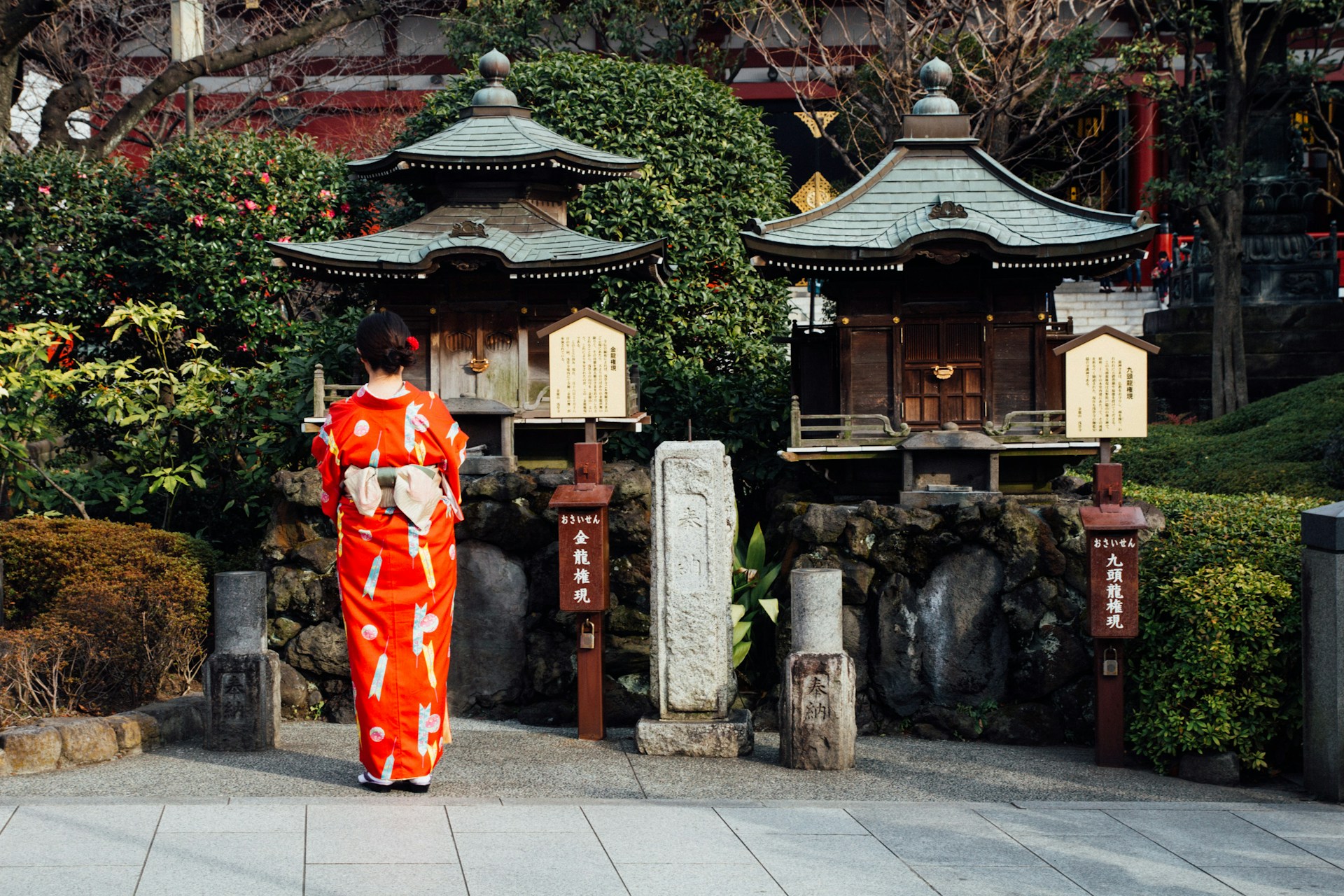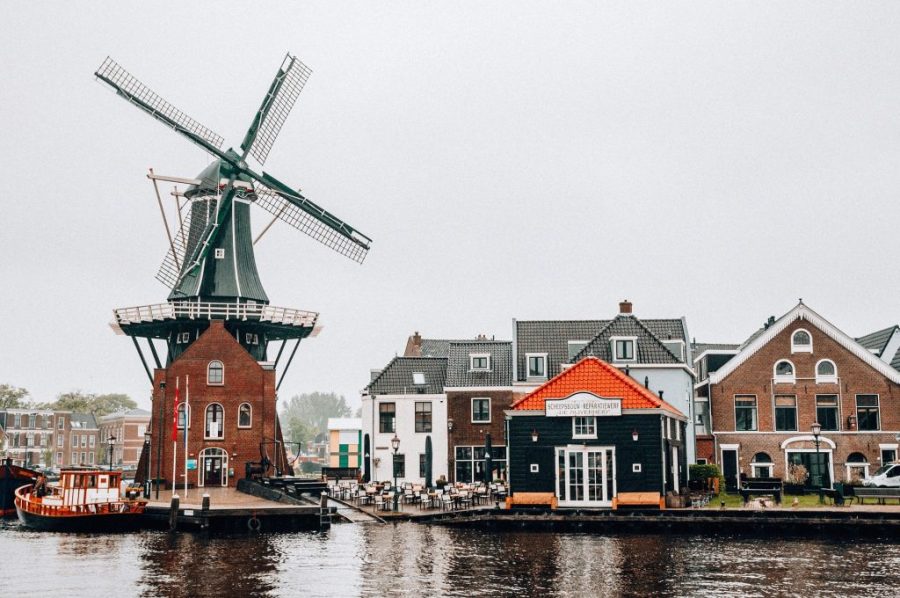Digital Nomad Visa for Sri Lanka: Requirements and how to apply
Sri Lanka's digital nomads visa is about to be launched. Find out what it is and how to apply.
Are you looking for an uncrowded destination for a more authentic digital nomad experience? Although Sri Lanka isn’t one of the favourite countries among the nomad community, it’s becoming increasingly popular. Cities like Colombo or Galle are adapting in leaps and bounds to the needs of remote workers and in 2021 the government announced a digital nomad visa for Sri Lanka.
Although this visa hasn’t yet entered into force, it’s expected to do so shortly. If it’s a destination that catches your eye, read on this guide we’ve prepared to tell you how to get everything ready to apply as soon as it comes out.
What’s the digital nomad visa in Sri Lanka and how does it work?
In 2021, Sri Lanka announced that it was joining the growing list of countries offering a visa for digital nomads. This programme would allow freelancers, employees and digital business owners to reside in the country while continuing their online work activities. According to initial statements, the visa would be valid for one year and cost approximately $500 USD.
As of today, the promised visa isn’t available and no definite date of entry into force has still been set.
What is known so far is that it would be aimed at freelancers, employees of international companies and digital entrepreneurs working for foreign clients or companies. One of its key features is that it won’t allow you to work for local companies. This way, they ensure that the measure to attract professionals who can contribute to economic dynamism doesn’t affect the internal labour market.
The legal underpinning of the programme falls within the framework of Sri Lanka’s migration policies and is designed to ensure both the safety of applicants and compliance with local regulations. While it’s obviously unknown how successful it will be, it‘s hoped that this visa will put Sri Lanka on the radar of digital nomads worldwide. In other countries with special visas for people with this lifestyle, it has worked very well.
If you can’t wait to move to Sri Lanka and live as a digital nomad in the country, there are alternatives. You can apply online for an Electronic Travel Authorization (ETA). This temporary tourist, business or transit visa is valid for 30 days, but it can be extended up to 270 days. It costs about $30, except for citizens of China, India, Indonesia, Russia, Thailand, Malaysia and Japan, which is free of charge.
In case you want to wait for the final launch of the digital nomad visa in Sri Lanka, it’s best to keep an eye out for official updates from the Sri Lankan Department of Immigration and Emigration.
Features of the digital nomad visa in Sri Lanka
As mentioned above, the exact conditions of the Sri Lankan digital nomad visa are still unknown. As far as is known, these are some of the keys that define it:
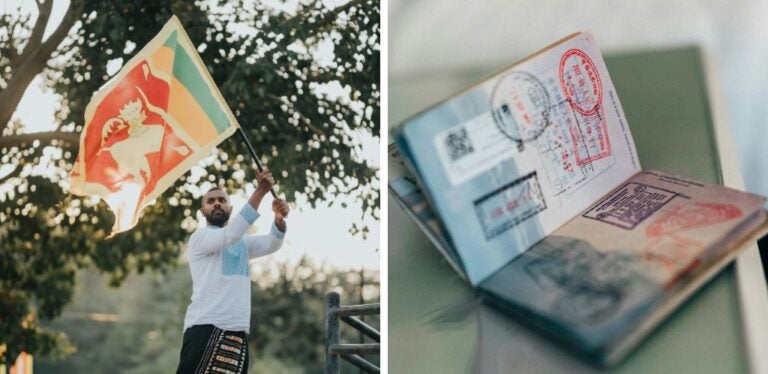
- Duration of stay: This visa is designed for long-term stays. Initially, it was announced that it would allow residence in the country for one year. However, with the possibility of extension.
- Minimum income requirement: One of the most important aspects of this visa is that applicants must demonstrate a minimum monthly income of $2,000 (€1,875). This would ensure that remote workers who move to Sri Lanka have sufficient financial resources to reside in the country without relying on local labour activities.
- Permitted activities: It’s aimed exclusively at professionals working for foreign companies or developing digital projects for international clients. This includes freelancers, remote workers and entrepreneurs operating online businesses. It’s not allowed to work for local companies or to engage in paid activities within the country.
- Family members included: Beneficiaries of this visa may include immediate family members, such as spouses and dependent children in their application.
- Application fee: According to initial proposals, an annual application fee of $500 (€470) would have to be paid to apply for the visa.
- Tax exemption: One of the major benefits of this residence permit is that income generated abroad will not be subject to local taxation in Sri Lanka.
General requirements for applying for a digital nomad visa in Sri Lanka
As with the exact conditions and benefits for digital nomads that the Sri Lankan digital nomad visa will have, the application requirements are a bit up in the air. In any case, taking into account the information provided when it was announced and the requirements that other countries usually ask for this type of permit, we could sum up the following conditions that you would have to fulfil to apply for it:
- Minimum monthly income: As mentioned above, it was announced that all those who want to enjoy this residence permit in Sri Lanka will have to prove that they have a minimum monthly income of $2,000. They must also be deposited in a local account.
- Verified remote employment: It’s more than likely that those interested will have to provide proof of their professional activity. Evidence can be employment contracts, letters of employment or documentation proving their work as freelancers or digital entrepreneurs for clients outside Sri Lanka.
- International health insurance: As in other countries, you’ll need to take out a policy that covers your entire stay in Sri Lanka and ensures access to medical services if needed.
- Criminal record certificate: A common requirement in programmes of this type is the submission of a document issued by the authorities of the country of origin or residence attesting to the absence of a criminal record.
- Passport valid for at least six months: It’s also expected that applicants will be required to hold a passport that’s valid for the duration of the intended period of stay.
Important: If you are a frequent traveler and want to stay connected without worrying about expensive roaming or looking for a new SIM at every destination, Holafly’s subscription plans are for you. With a single eSIM, enjoy internet in more than 170 countries for a fixed price and no surprises on your bill. Travel without limits and connect easily and securely! 🚀🌍

Documentation to be submitted
As the final requirements and the application process become more detailed, we’ll be able to further look into the documentation needed. According to the information given so far and what’s usually requested in other countries offering similar visas, you’ll most likely be required to submit:
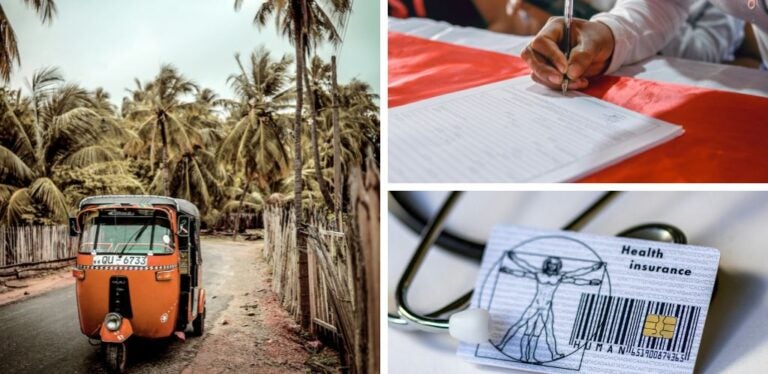
- Application form: Sri Lanka has launched a special website to apply for this visa, but it’s not currently available. It’s unknown whether it will be operational again or whether a section will be added on the same page where the ETA permit is applied for.
- Valid passport: A copy of the main pages of the passport will most likely be requested. The document must be valid for at least six months from the date of entry.
- Proof of income: Applicants must provide recent bank statements showing a minimum monthly income of $2,000. Furthermore, if all goes as first announced, it’s expected that this income will have to be managed through the Sri Lankan banking system once the visa is obtained.
- Evidence of remote employment: This type of permit usually requires the submission of employment contracts, letters of reference or evidence of completed projects demonstrating that the applicant is working remotely for foreign clients or employers.
- Proof of payment of the visa fee: Initially there was talk of a $500 fee. Given that it’s quite some time since the announcement, it’s possible that this has changed. The exact amount will be confirmed once the programme comes into force.
Where can I apply for a digital nomad visa for Sri Lanka?
As you might guess, there’s still no way to apply for this visa for digital nomads in Sri Lanka. What we can tell you by now, is that visa application processes for this country are usually quite swift. For example, you can apply for an Electronic Travel Authorisation (ETA) through a website made available by the Department of Immigration and Emigration. The process is very easy, quick and intuitive.
If it’s going to be similar to the ETA (Electronic Travel Authorisation) application process, the most common way to apply is online. Through the official website of the Department of Immigration and Emigration of Sri Lanka. You can also apply at some Sri Lankan consulates if you have difficulties with the digital system, but this is less common. Once the application is submitted, the authorisation is usually received by email within 24-72 hours.
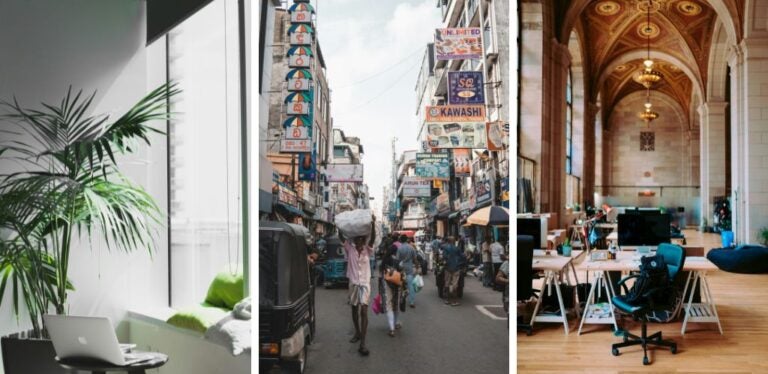
Where can I get tailored advice?
As you can see, everything about this new residence permit as a remote worker in Sri Lanka is a bit up in the air. The easiest thing to do, if you want to avoid going round in circles and keeping up with the latests news, is to ask for help from companies specialising in this type of procedure. These are some of the most important options for all things related with visas in Sri Lanka:
- World Wide Visa Consultancy (Pvt) Ltd: Located in Colombo, it offers comprehensive visa advice with a specialised migration team. You can contact them at their office at No:652/1, Galle Road, Rathmalana, by phone at +94 112 633333 or by email at info@wwvisa.com. They are open from Monday to Friday, from 9:00 to 17:00 hours.
- Hayleys Travels: Experienced in the travel and visa industry, this Colombo-based company offers assistance in English and Sinhalese. His office is at 400, Deans Road. You can contact them at (+94) 11 2 168100 or travels@aviation.hayleys.com. Their opening hours are from Monday to Friday, from 8:30 to 17:00 hours.
- Entriva: Although not physically based in Sri Lanka, Entriva operates online and offers assistance in English and Spanish for the processing of ETA visas and other related permits. You can contact them by email at info@entriva.com or visit their website. They are open 24 hours a day.
Before choosing one, remember to check their credentials and compare their rates. If you’re already in Sri Lanka, remember to get your Holafly eSIM so you can contact the company you choose and keep up with any updates on the digital nomad visa for Sri Lanka.
Frequently asked questions when applying for a digital nomad visa for Sri Lanka
Although the digital nomad visa in Sri Lanka was announced in 2021, it has so far not been officially implemented and no effective date has been set. The authorities have put forward preliminary details of its operation, but there’s no formal application process yet. That’s why it’s essential to keep up with the Sri Lankan Department of Immigration and Emigration or by contacting the Sri Lankan embassies.
No. The digital nomad visa in Sri Lanka is designed for those who work remotely for companies or clients outside the country. This ensures that beneficiaries don’t compete with the local workforce. If your goal is to work for a local company, you should explore other permits that allow for paid employment in the country.
One of the main requirements for obtaining a digital nomad visa in Sri Lanka is to prove a monthly income of at least $2,000 (about €1,875). If you don’t meet this income, your application may be rejected. However, you could consider other visa options, such as tourist or business visas, although these don’t allow you to work remotely. It’s advisable to consult with visa experts to look at alternatives.
Besides working for your international clients or employers, with a digital nomad visa in Sri Lanka you have a lot to see and do. It includes exploring the national parks, surfing its famous beaches and visiting historic temples. The visa has no restrictions on tourism or recreational activities, as long as they do not involve paid work in the country.
According to preliminary details, the digital nomad visa in Sri Lanka will allow for stays of up to one year. However, this data is subject to confirmation once the final regulation is published.
This will depend on the regulations set by the authorities when the visa comes into force. In other countries, it’s common for applicants to apply from their place of residence. For now, those already in Sri Lanka can explore the option of extending their tourist visa while waiting for the digital nomad visa to become available.
The key is to prepare all the necessary documents in advance and to strictly comply with the established requirements. Make sure your proof of income, criminal record and health insurance are up to date and in order. In addition, following the instructions of the official authorities and avoiding mistakes in the application form will increase your chances of success.
Yes, Sri Lanka has a growing community of digital nomads, especially in cities such as Colombo, Galle and coast areas such as Mirissa and Arugam Bay. These places offer coworking spaces, cafés with good Wi-Fi and events that facilitate the connection between remote professionals. In addition, the hospitality of the local people and the cultural diversity enrich the experience of living and working in the country.
The quality of internet connection in Sri Lanka has improved in recent years, especially in urban and tourist areas. According to Cloudflare data, the country has experienced gains in bandwidth and latency, although stability may vary by location. However, it’s advisable to use a good VPN to ensure your security and privacy. You can find out which ones are the best in our VPN guide for digital nomads.
Sri Lanka offers a wide range of accommodation options for digital nomads to suit different budgets and preferences. From budget hostels and guesthouses to flats and private villas. Platforms such as Airbnb and Booking.com are useful for finding short and long-term accommodation. In addition, in areas with digital nomad communities, it’s common to find coliving spaces that combine accommodation and shared workspaces.





 Language
Language 


















 No results found
No results found


